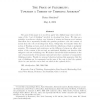Free Online Productivity Tools
i2Speak
i2Symbol
i2OCR
iTex2Img
iWeb2Print
iWeb2Shot
i2Type
iPdf2Split
iPdf2Merge
i2Bopomofo
i2Arabic
i2Style
i2Image
i2PDF
iLatex2Rtf
Sci2ools
IUI
1993
ACM
1993
ACM
The price of flexibility
The goal of this paper is to model an agent who dislikes large choice sets because of the “cost of thinking” involved in choosing from them. We take as a primitive a preference relation over lotteries of menus and impose novel axioms that allow us to separately identify the genuine preference over the content of menus from the cost of choosing from them. Using this, we formally define the notion of thinking aversion, much in line with the definitions of risk or ambiguity aversion. We represent such preference as the difference between an affine evaluation of the content of the set and an anticipated thinking cost function that assigns to each set a thinking cost. We further extend this characterization to the case of monotonicity of the genuine rank and introduce a measure of comparative thinking aversion. Finally, we propose behavioral axioms that guarantee that the cost of thinking can be represented as the sum of the cost to find the optimal choice in a set and the cost to ...
Related Content
| Added | 10 Aug 2010 |
| Updated | 10 Aug 2010 |
| Type | Conference |
| Year | 1993 |
| Where | IUI |
| Authors | David D. Woods |
Comments (0)

